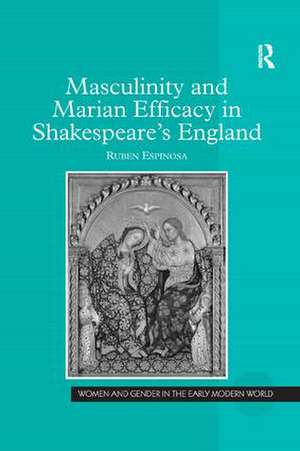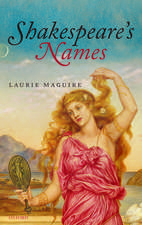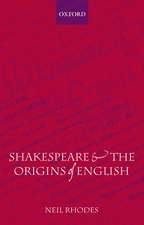Masculinity and Marian Efficacy in Shakespeare's England: Women and Gender in the Early Modern World
Autor Ruben Espinosaen Limba Engleză Paperback – 17 noi 2016
| Toate formatele și edițiile | Preț | Express |
|---|---|---|
| Paperback (1) | 489.26 lei 6-8 săpt. | |
| Taylor & Francis – 17 noi 2016 | 489.26 lei 6-8 săpt. | |
| Hardback (1) | 992.05 lei 6-8 săpt. | |
| Taylor & Francis – 28 mar 2011 | 992.05 lei 6-8 săpt. |
Din seria Women and Gender in the Early Modern World
-
 Preț: 289.10 lei
Preț: 289.10 lei - 9%
 Preț: 1003.31 lei
Preț: 1003.31 lei - 8%
 Preț: 383.57 lei
Preț: 383.57 lei -
 Preț: 313.71 lei
Preț: 313.71 lei - 9%
 Preț: 936.16 lei
Preț: 936.16 lei - 19%
 Preț: 364.64 lei
Preț: 364.64 lei -
 Preț: 223.84 lei
Preț: 223.84 lei - 9%
 Preț: 934.94 lei
Preț: 934.94 lei - 18%
 Preț: 1054.71 lei
Preț: 1054.71 lei - 18%
 Preț: 1000.27 lei
Preț: 1000.27 lei - 18%
 Preț: 1054.71 lei
Preț: 1054.71 lei - 18%
 Preț: 1000.27 lei
Preț: 1000.27 lei - 25%
 Preț: 497.08 lei
Preț: 497.08 lei - 18%
 Preț: 1000.27 lei
Preț: 1000.27 lei -
 Preț: 369.73 lei
Preț: 369.73 lei - 25%
 Preț: 826.01 lei
Preț: 826.01 lei - 18%
 Preț: 1056.63 lei
Preț: 1056.63 lei - 18%
 Preț: 1057.09 lei
Preț: 1057.09 lei - 18%
 Preț: 1053.92 lei
Preț: 1053.92 lei - 25%
 Preț: 768.30 lei
Preț: 768.30 lei - 26%
 Preț: 764.20 lei
Preț: 764.20 lei - 26%
 Preț: 764.20 lei
Preț: 764.20 lei - 18%
 Preț: 1001.84 lei
Preț: 1001.84 lei - 26%
 Preț: 819.48 lei
Preț: 819.48 lei - 18%
 Preț: 1113.12 lei
Preț: 1113.12 lei -
 Preț: 369.73 lei
Preț: 369.73 lei - 16%
 Preț: 234.90 lei
Preț: 234.90 lei - 18%
 Preț: 1061.81 lei
Preț: 1061.81 lei - 25%
 Preț: 766.85 lei
Preț: 766.85 lei - 18%
 Preț: 1060.25 lei
Preț: 1060.25 lei - 26%
 Preț: 734.75 lei
Preț: 734.75 lei - 18%
 Preț: 1061.81 lei
Preț: 1061.81 lei - 18%
 Preț: 1061.06 lei
Preț: 1061.06 lei - 26%
 Preț: 878.57 lei
Preț: 878.57 lei - 18%
 Preț: 1064.70 lei
Preț: 1064.70 lei - 18%
 Preț: 1107.61 lei
Preț: 1107.61 lei - 26%
 Preț: 736.38 lei
Preț: 736.38 lei - 18%
 Preț: 1061.06 lei
Preț: 1061.06 lei - 18%
 Preț: 992.05 lei
Preț: 992.05 lei - 26%
 Preț: 819.84 lei
Preț: 819.84 lei - 25%
 Preț: 767.07 lei
Preț: 767.07 lei - 25%
 Preț: 769.92 lei
Preț: 769.92 lei - 18%
 Preț: 1057.09 lei
Preț: 1057.09 lei - 18%
 Preț: 1109.18 lei
Preț: 1109.18 lei - 26%
 Preț: 821.53 lei
Preț: 821.53 lei - 18%
 Preț: 1000.27 lei
Preț: 1000.27 lei
Preț: 489.26 lei
Nou
Puncte Express: 734
Preț estimativ în valută:
93.63€ • 96.93$ • 79.14£
93.63€ • 96.93$ • 79.14£
Carte tipărită la comandă
Livrare economică 06-20 martie
Preluare comenzi: 021 569.72.76
Specificații
ISBN-13: 9781138268111
ISBN-10: 1138268119
Pagini: 208
Dimensiuni: 156 x 234 x 11 mm
Greutate: 0.45 kg
Ediția:1
Editura: Taylor & Francis
Colecția Routledge
Seria Women and Gender in the Early Modern World
Locul publicării:Oxford, United Kingdom
ISBN-10: 1138268119
Pagini: 208
Dimensiuni: 156 x 234 x 11 mm
Greutate: 0.45 kg
Ediția:1
Editura: Taylor & Francis
Colecția Routledge
Seria Women and Gender in the Early Modern World
Locul publicării:Oxford, United Kingdom
Notă biografică
Ruben Espinosa is Assistant Professor of English at the University of Texas at El Paso, USA.
Recenzii
'Ruben Espinosa's eloquent and sensitive study of nine of Shakespeare's plays, from an early history through the late Romances, makes a compelling case for how the fracturing of Marian efficacy in post-Reformation England not only influenced the construction of gender in English culture, but also shaped Shakespeare's dramaturgy. ' Katharine Goodland, CUNY College of Staten Island, author Female Mourning and Tragedy in Medieval and Renaissance English Drama 'Persuasively argued, this study confirms what scholars have been slow to recognize - that the Virgin Mary was a powerful presence on the English stage. Although the Virgin May may have been marginalized by Protestant theology and polemic, her potency, comfort, and efficacy could not be erased from the English psyche and was available for reimaging on the early modern English stage.' Renaissance Quarterly '[Espinosa] is careful not to be too reductive; his argument is not one-to-one mapping of Marian symbology, but a careful, nuanced hunt for motifs that both sustain and potentially disrupt conceptions of Protestant, English masculinity.' Sixteenth Century Studies Journal
Cuprins
Introduction; Chapter 1 “England, Mary’s Dowry”; Chapter 2 Marian Intercession and Intercessory Promiscuity in The Merchant of Venice and Measure for Measure; Chapter 3 Virgins, Mothers, and the Virgin Mother in Hamlet, Othello, and King Lear; Chapter 4 Marian Miracles and the Theatrical Wonder of Antony and Cleopatra, Pericles, and The Winter’s Tale; Chapter 101 Afterword;
Descriere
Masculinity and Marian Efficacy in Shakespeare's England offers a new approach to evaluating the psychological "loss" of the Virgin Mary in post-Reformation England. The author surveys the early modern cultural and literary response to Mary's marginalization; he argues that Shakespeare employs both Roman Catholic and post-Reformation views of Marian strength not only to scrutinize cultural perceptions of masculinity, but also to offer his audience new avenues of exploring both religious and gendered subjectivity.

















